In a brand-new blog series, we will be exploring the various subjects offered by Impaq in the FET Phase (Grades 10 – 12). We spoke to education specialist Janet Zandberg and Impaq alumnus Carla Botha to learn more about Agricultural Sciences and Agricultural Management Practices as subjects.
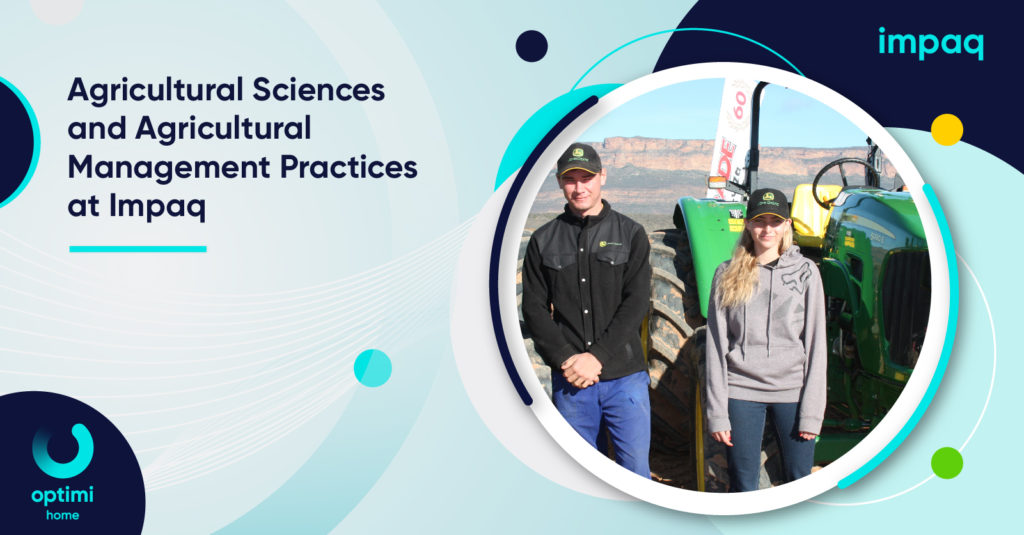
Agricultural Sciences vs Agricultural Management Practices
While choosing subjects in Grade 9, many learners are unsure of the difference between Agricultural Sciences and Agricultural Management Practices. We asked Zandberg to explain the differences between these two subjects below.
Agricultural Sciences
“Agricultural Sciences (AGS) is a science,” Zandberg says. It is the study of the relationship between soils, plants, and animals in the production and processing of food, fibre, fuel, and other agricultural commodities with economic, aesthetic, and cultural value.
Zandberg says that Agricultural Sciences is a subject that can be used when a learner wants to go to university to study for a bachelor’s degree or a diploma. Agricultural Sciences contains content such as:
- soil sciences,
- basic agricultural chemistry,
- animal nutrition,
- animal reproduction, and
- genetics.
Agricultural Management Practices
“Agricultural Management Practices (AMP) is a more practical subject,” Zandberg explains. It is the study and application of production, economic, and management principles used in the cultivation, transformation, and marketing of food and other agricultural products.
Learners who take Agricultural Management Practices must complete a practical assessment task (PAT) on a farm for 40 hours in Grade 10, 11 and 12. Agricultural Management Practices contains content such as:
- crop production and management,
- animal management practices,
- plant reproduction,
- farm planning, and
- production management.
“If a learner loves farming and animals, Agricultural Management Practices is a better choice,” Zandberg says.
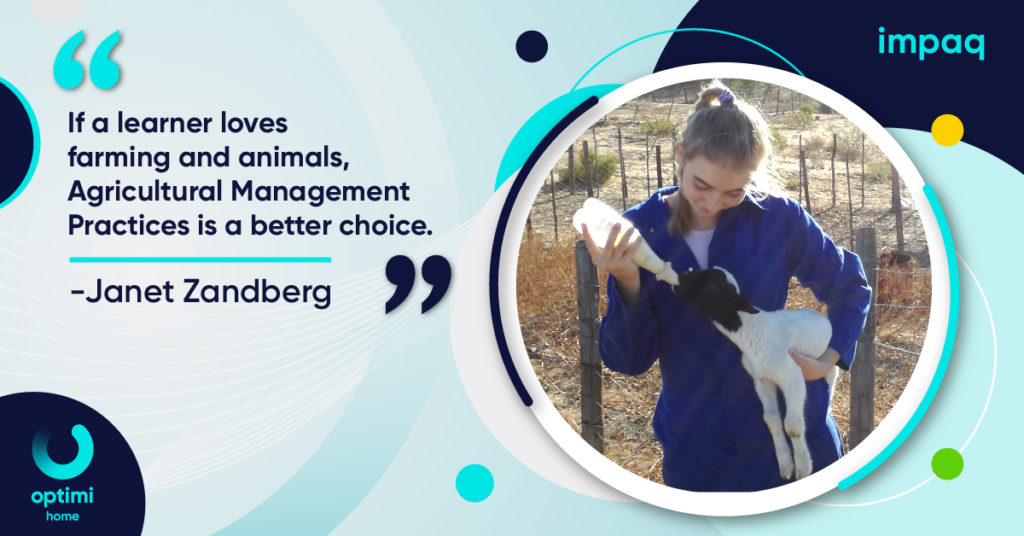
farming is a possible career option, Agricultural Management Practices will be the best choice,” Zandberg says. “For further study, Agricultural Sciences will be the best choice,” she adds.
Life is better on the farm
Carla Botha, who has been studying through Impaq since Grade 1, says that she had no doubt about the subjects she wanted to choose when making subject choices in Grade 9. “For as long as I can remember, I have wanted to be a farmer,” Botha explains. When she learned that Impaq offered two agricultural subjects in the FET Phase, she was overjoyed. “When the time came to choose my subjects there was no doubt that I would take both,” she adds.
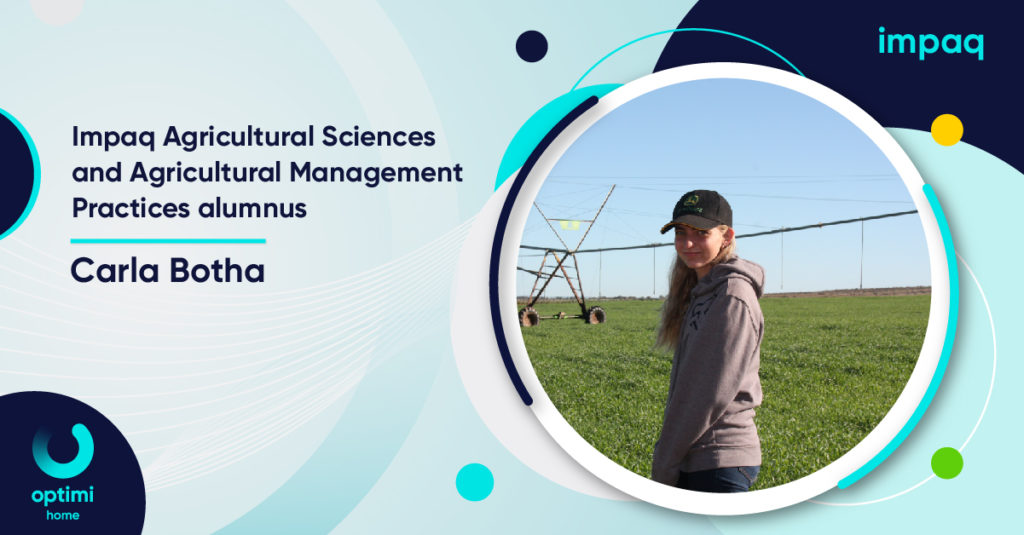
Completing her practical assessment tasks in Agricultural Management Practices was the highlight of Botha’s school year, three years in a row. “Getting to document every aspect of ‘my farm’ was so much fun. I had an excuse to take over 500 photos of everything farm related,” she explains. Botha also enjoyed the depth of the lesson material when it came to Agricultural Sciences. “The knowledge I obtained helps me in my everyday work,” she explains.
Also read: How to easily complete practical subjects through home education
What you plant now, you will harvest later
Both Agricultural Sciences and Agricultural Management Practices requires hard work to complete the subjects successfully. “In both subjects, learners will have to put in a lot of effort,” Zandberg says.
Agricultural Sciences
Zandberg advises learners to only take Agricultural Sciences if they plan on going to a university or college for further training. “It is a challenging subject and must not be underestimated,” Zandberg says. Botha agrees and says that she had difficulty with the chemistry aspect of the subject in Grade 11. “This was my first encounter with chemistry, and I dreadfully struggled to master this part of the subject,” she explains.
While taking Mathematics with Agricultural Sciences is not compulsory, Mathematics will be a requirement if a learner wants to study BSc Agricultural or Veterinary Sciences after completing Grade 12.
Top tip: Ensure that you know what the requirements are for further study at tertiary institutions.
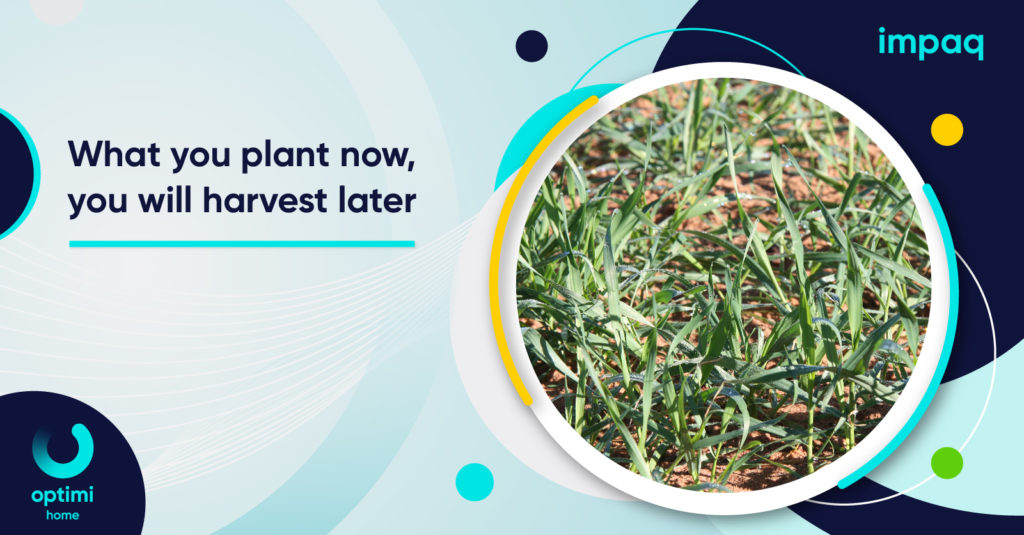
Also read: How to change a learner’s perception of difficulty to achieve success
Agricultural Management Practices
Zandberg explains that if learners take Agricultural Management Practices, they will need access to a farm to complete their practical assessments tasks (PATs) successfully. “Learners must be part of the practical activities on a farm or an active production enterprise for at least 40 hours per year,” Zandberg says.
A farmer or veterinarian must assess the PAT. If the assessor is a farmer, the farmer must have been operating the farming enterprise for at least five (5) years. If the assessor is a veterinarian, their qualification, practice number, and the number of years they have operated their practice must be submitted along with the PAT.
Botha says that with Agricultural Management Practices, she did not struggle with the lesson material as it was her favourite subject. “There were a few of the assignments that were out of season for my area, Vanrhynsdorp in the Western Cape, and it brought forth a bit of a challenge but nevertheless it was fun,” Botha explains.
Top tip: Ensure that you have access to a farm when choosing Agricultural Management Practices as a subject.
Leaders in the field
Agricultural Sciences and Agricultural Management Practices prepares learners for entry into further studies for a possible career in a variety of fields (pun intended).
Typical career paths for Agricultural Sciences include:
- a veterinarian or veterinarian assistant,
- agricultural researcher,
- soil researcher,
- a career in animal or plant studies, and
- a biologist.
Typical career paths for Agricultural Management Practices include practical work such as:
- farming,
- farm management,
- managing different plant crops, and
- caring for farm animals.
Working in acres, not in hours
Since Botha graduated as the top Impaq learner in Agricultural Sciences and Agricultural Management Practices in 2019, she has been working as a farm manager. “My focus has primarily been on animal health and reproduction,” Botha says. She, however, has ambitions to become a mega farmer.
Also read: Life after matric – guiding your child during this next chapter

Her advice to other young aspiring farmers is to work hard every day. “Use as many previous papers as possible when studying and use more than one study method to obtain success,” Botha adds. “And lastly, enjoy it,” Botha concludes.
By Elmien Ackerman


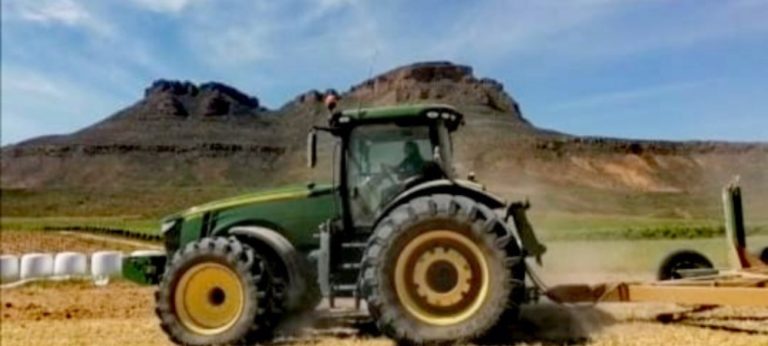













Leave a Reply